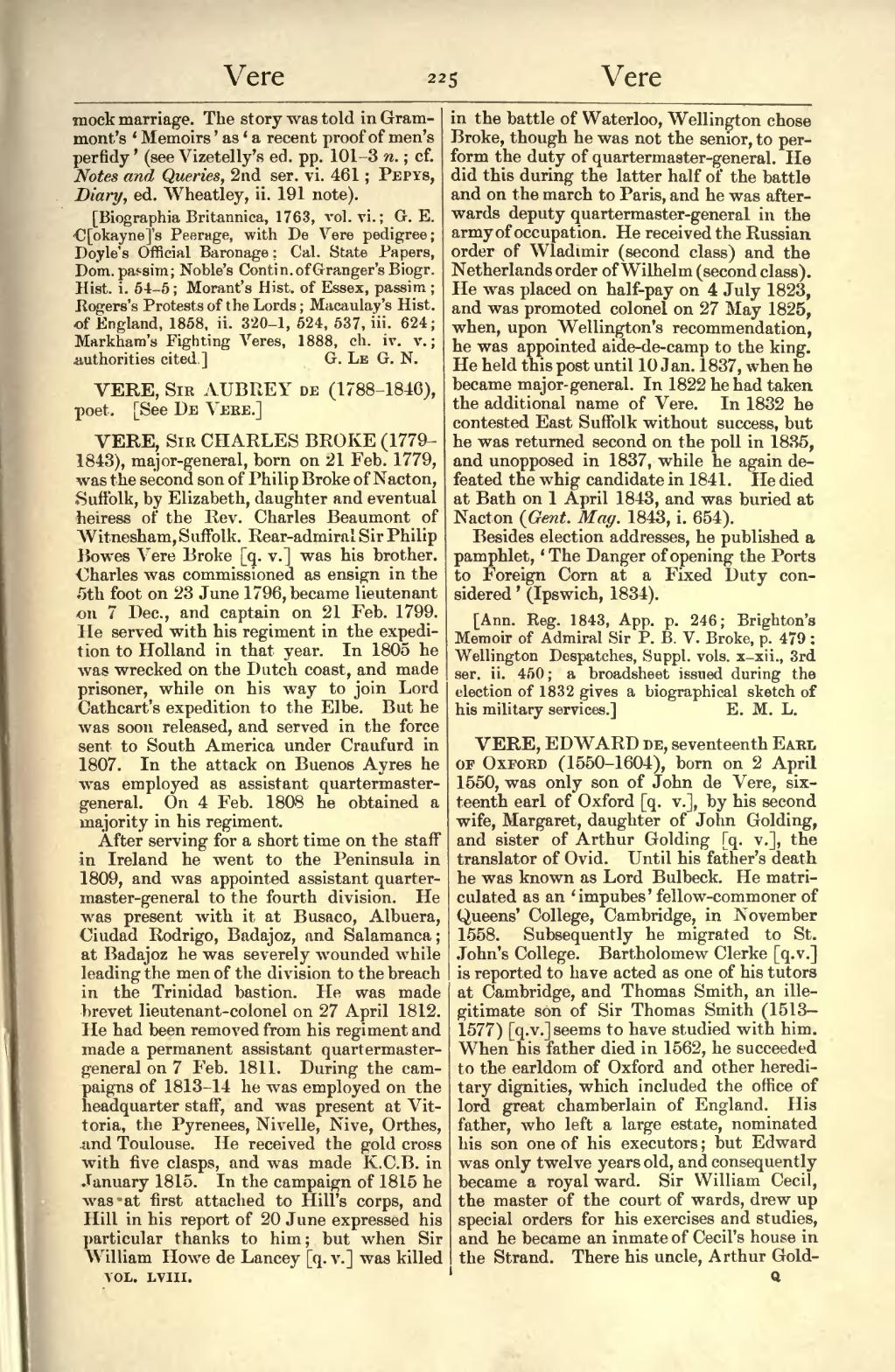mock marriage. The story was told in Grammont's ‘Memoirs’ as ‘a recent proof of men's perfidy’ (see Vizetelly's ed. pp. 101–3 n.; cf. Notes and Queries, 2nd ser. vi. 461; Pepys, Diary, ed. Wheatley, ii. 191 note).
[Biographia Britannica, 1763, vol. vi.; G. E. C[okayne]'s Peerage, with De Vere pedigree; Doyle's Official Baronage; Cal. State Papers, Dom. passim; Noble's Contin. of Granger's Biogr. Hist. i. 54–5; Morant's Hist. of Essex, passim; Rogers's Protests of the Lords; Macaulay's Hist. of England, 1858, ii. 320–1, 524, 537, iii. 624; Markham's Fighting Veres, 1888, ch. iv. v.; authorities cited.]
VERE, Sir AUBREY de (1788-1840), poet. [See De Vere.]
VERE, Sir CHARLES BROKE (1779–1843), major-general, born on 21 Feb. 1779, was the second son of Philip Broke of Nacton, Suffolk, by Elizabeth, daughter and eventual heiress of the Rev. Charles Beaumont of Witnesham, Suffolk. Rear-admiral Sir Philip Bowes Vere Broke [q. v.] was his brother. Charles was commissioned as ensign in the 5th foot on 23 June 1796, became lieutenant on 7 Dec., and captain on 21 Feb. 1799. He served with his regiment in the expedition to Holland in that year. In 1805 he was wrecked on the Dutch coast, and made prisoner, while on his way to join Lord Cathcart's expedition to the Elbe. But he was soon released, and served in the force sent to South America under Craufurd in 1807. In the attack on Buenos Ayres he was employed as assistant quartermaster-general. On 4 Feb. 1808 he obtained a majority in his regiment.
After serving for a short time on the staff in Ireland he went to the Peninsula in 1809, and was appointed assistant quartermaster-general to the fourth division. He was present with it at Busaco, Albuera, Ciudad Rodrigo, Badajoz, and Salamanca; at Badajoz he was severely wounded while leading the men of the division to the breach in the Trinidad bastion. He was made brevet lieutenant-colonel on 27 April 1812. He had been removed from his regiment and made a permanent assistant quartermaster-general on 7 Feb. 1811. During the campaigns of 1813–14 he was employed on the headquarter staff, and was present at Vittoria, the Pyrenees, Nivelle, Nive, Orthes, and Toulouse. He received the gold cross with five clasps, and was made K.C.B. in January 1815. In the campaign of 1815 he was at first attached to Hill's corps, and Hill in his report of 20 June expressed his particular thanks to him; but when Sir William Howe de Lancey [q. v.] was killed in the battle of Waterloo, Wellington chose Broke, though he was not the senior, to perform the duty of quartermaster-general. He did this during the latter half of the battle and on the march to Paris, and he was afterwards deputy quartermaster-general in the army of occupation. He received the Russian order of Wladimir (second class) and the Netherlands order of Wilhelm (second class). He was placed on half-pay on 4 July 1823, and was promoted colonel on 27 May 1825, when, upon Wellington's recommendation, he was appointed aide-de-camp to the king. He held this post until 10 Jan. 1837, when he became major-general. In 1822 he had taken the additional name of Vere. In 1832 he contested East Suffolk without success, but he was returned second on the poll in 1835, and unopposed in 1837, while he again defeated the whig candidate in 1841. He died at Bath on 1 April 1843, and was buried at Nacton (Gent. Mag. 1843, i. 654).
Besides election addresses, he published a pamphlet, ‘The Danger of opening the Ports to Foreign Corn at a Fixed Duty considered’ (Ipswich, 1834).
[Ann. Reg. 1843, App. p. 246; Brighton's Memoir of Admiral Sir P. B. V. Broke, p. 479; Wellington Despatches, Suppl. vols. x–xii., 3rd ser. ii. 450; a broadsheet issued during the election of 1832 gives a biographical sketch of his military services.]
VERE, EDWARD de, seventeenth Earl of Oxford (1550–1604), born on 2 April 1550, was only son of John de Vere, sixteenth earl of Oxford [q. v.], by his second wife, Margaret, daughter of John Golding, and sister of Arthur Golding [q. v.], the translator of Ovid. Until his father's death he was known as Lord Bulbeck. He matriculated as an ‘impubes’ fellow-commoner of Queens' College, Cambridge, in November 1558. Subsequently he migrated to St. John's College. Bartholomew Clerke [q. v.] is reported to have acted as one of his tutors at Cambridge, and Thomas Smith, an illegitimate son of Sir Thomas Smith (1513–1577) [q. v.] seems to have studied with him. When his father died in 1562, he succeeded to the earldom of Oxford and other hereditary dignities, which included the office of lord great chamberlain of England. His father, who left a large estate, nominated his son one of his executors; but Edward was only twelve years old, and consequently became a royal ward. Sir William Cecil, the master of the court of wards, drew up special orders for his exercises and studies, and he became an inmate of Cecil's house in the Strand. There his uncle, Arthur Gold-
